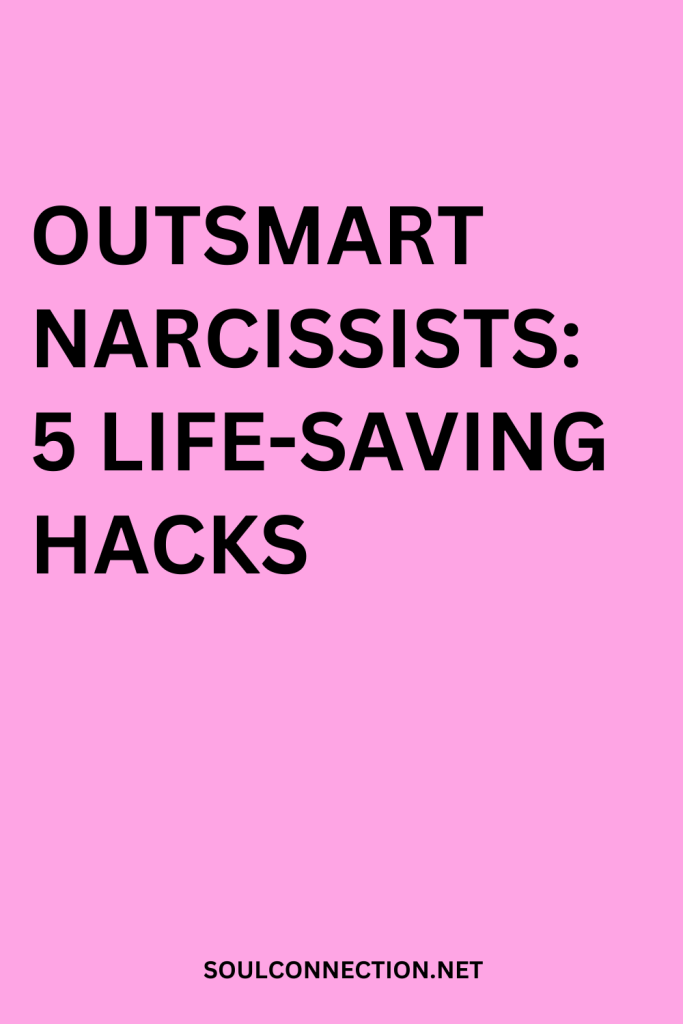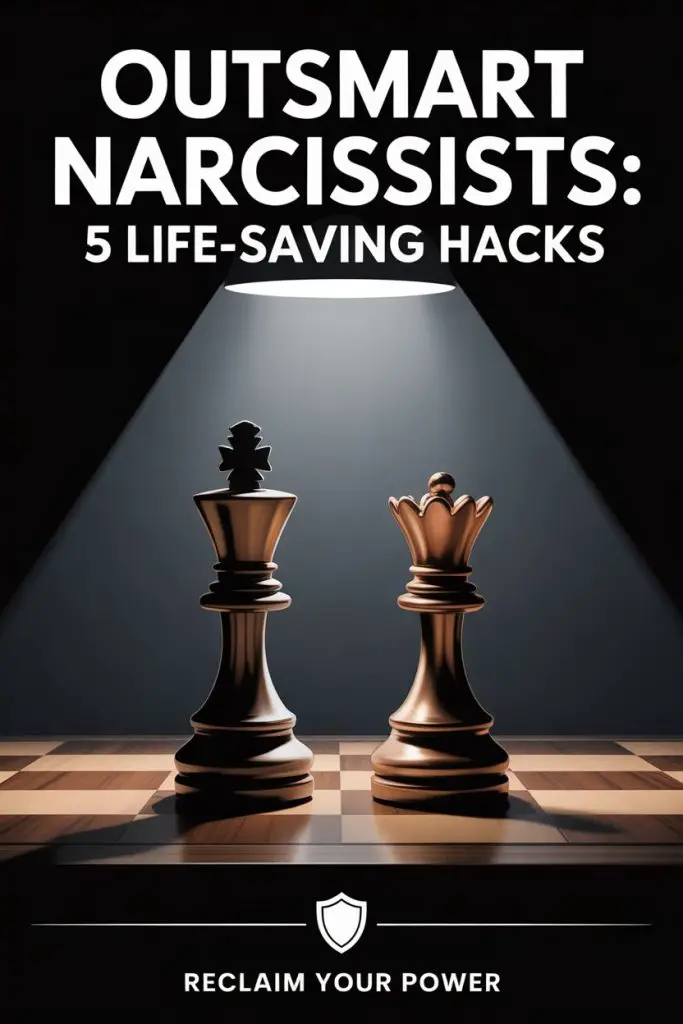Ever found yourself caught in a conversation where you can’t get a word in edgewise, your accomplishments suddenly shrink, and you’re not sure how you ended up apologizing for their bad day?
Welcome to the funhouse mirror that is a relationship with a narcissist. The good news: you’re not powerless. A few strategic tweaks can change the game—without turning you into a doormat or, worse, a mini-narcissist yourself.
Here’s how to keep your sanity, sidestep their emotional landmines, and keep your sense of humor intact.
1. Set Boundaries Like Your Life Depends On It
Narcissists see boundaries the way toddlers see bedtime—a suggestion, not a requirement. But your boundaries are your oxygen mask.
Without them, you’ll find yourself gasping for air, bending over backwards, and wondering why you’re so exhausted.
The trick? Make your limits clear and stick to them like super glue, no apologies or wobbles.
You don’t owe anyone a PowerPoint presentation on why you need personal space, privacy, or a night off from their drama.
Expect pushback. That’s their love language.
You might hear, “You’re so sensitive,” or, “Why are you being difficult?” Translation: “Why can’t I have my way?” Resist the urge to explain yourself into the ground.
A simple “This doesn’t work for me,” or “I’m not available at that time,” is enough. If you waffle, they’ll sense it and push harder.
If you’re feeling brave, set your phone to Do Not Disturb and watch the fireworks from a safe distance.
2. Master the Art of the Gray Rock
Narcissists crave drama the way seagulls crave chips. Give them nothing, and suddenly you’re not nearly as fun to peck at.
Gray rocking is just what it sounds like: become as interesting as a rock. Channel your inner beige paint sample.
When they bait you with outrageous comments, wild accusations, or emotional pyrotechnics, respond with as little energy as you’d expend reading the terms and conditions on your wi-fi contract.
Monosyllabic answers are your friend. Keep your tone flat. Don’t rise to the bait or try to outwit them in the theatre of the absurd. The less of a reaction you give, the less fun you are to torment.
And when you’re boring, a narcissist’s attention wanders elsewhere—often blessed relief.
One caveat: it can feel unnatural, even rude. (Especially if you’ve been trained to keep the peace at any cost.) Practice in front of a mirror, or with a mate who won’t judge your impression of a pet rock.
3. Document Everything Like You’re Preparing for a True Crime Podcast
Here’s a plot twist: narcissists have a selective memory. Conversations get rewritten, promises vanish, and suddenly you’re the villain in a story you barely recognize. To stay sane (and avoid gaslighting yourself), keep a record.
Don’t worry, you don’t need to start every sentence with, “For the record…” Just jot down key interactions—dates, times, what was said. Save important texts and emails.
If things ever escalate and you need support from HR, friends, family, or (in extreme cases) legal help, you’ll be glad you have a paper trail.
This isn’t about winning a court case (though sometimes it helps), but about keeping your own grip on reality.
When you look back and see the pattern—how apologies are always demanded but never given, how every argument ends with you feeling guilty for existing—you’ll be less likely to buy the next rewrite of history.
Pro tip: resist the temptation to confront them with your evidence. That usually triggers a smoke bomb of denial, outrage, and circular reasoning. Hold your receipts for your own clarity, not as ammunition.
4. Craft Your Support Squad
Ever tried to explain narcissistic abuse to someone who’s never experienced it? Often you get blank stares, or worse: “Well, everyone’s a bit self-absorbed, aren’t they?”
The antidote is finding people who get it. Maybe it’s a therapist who knows narcissism inside out. Maybe it’s a mate who can spot manipulation at twenty paces.
Or perhaps you find community in online forums, support groups, or that one wise relative who survived a narcissistic parent and lived to tell the tale.
Share your experiences. Compare notes. Laugh at the sheer audacity of some stunts you’ve endured. Validation is powerful, and it inoculates you against self-doubt.
Don’t underestimate humour here. Sometimes it’s the only way to process the sheer bonkers-ness of narcissistic behaviour.
Swap stories, have a chuckle, and remind yourself that you’re not losing your marbles—someone else is just rearranging yours.
5. Reclaim Your Self-Worth
Nothing messes with self-esteem quite like a narcissist’s relentless drip-drip of criticism, comparison, and one-upmanship. If you’re waiting for them to finally see your worth, you’ll be waiting longer than a bus on a bank holiday.
Here’s the reality check: your value isn’t decided by someone else’s inability to appreciate it.
Start collecting evidence of your own awesomeness. Write down compliments you receive. Remember achievements big and small.
Surround yourself with reminders that you’re capable and lovable, even if your narcissist can’t stand the spotlight not being on them.
Practice speaking to yourself the way you’d talk to a friend: kindly, firmly, and with a dash of sass.
When the narcissist rolls out their greatest hits—“You’re too sensitive,” “No one else would put up with you,” and the classic, “You’ll never find better”—remind yourself that your worth isn’t up for debate.
Self-care isn’t selfish, it’s survival. Treat yourself to something nice, or just a quiet cuppa without someone monologuing over your every sip.
Outsmarting Narcissists: Your Secret Superpower
It takes guts, grit, and more than a little humour to outsmart a narcissist. Their antics are predictable once you know the script: boundary-busting, attention-hogging, reality-bending, and the occasional Oscar-worthy tantrum.
Applying these life-saving hacks doesn’t mean you’ll turn every encounter into a win. Sometimes, the win is just preserving your peace.
Other times, it’s sidestepping the trap and refusing to play the villain in someone else’s drama.
You’re not “too sensitive.” You’re not “overreacting.” You’re someone who deserves respect, space, and actual listening—not just someone to prop up someone else’s ego.
And if all else fails? Take your tea, your self-respect, and your sanity, and give yourself the gift of distance.
You’ve got this.


